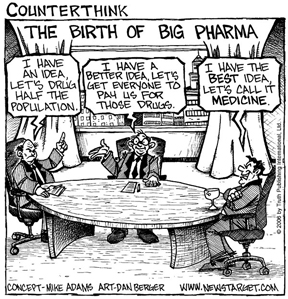
The recent sex and corruption case at the Central Narcotics Bureau has certainly woken many people up. But there is really nothing new here other than the titillating stories of trysts and late night sexting between two very gatal (itchy) people. Sex sells. And all through history women have used their wiles to charm their way into position, power and wealth. So was this corruption, or just two very gatal people acting out their fantasies? We won't know for some time, and Gigamole will not speculate.
Nonetheless, Gigamole is reminded that the medical and health industry is not immune to such sex and corruption issues. Just that many do not get flagged out.
The WHO has estimated that the about US$4.1 trillion is spent globally on health services and of this, US$750 billion was on pharmaceuticals. It is a massive industry. The pharma companies aggressively compete for this market, and many (if not all) resort to unsavoury methods to market their wares.
Recently GSK was fined US3 billion for illegal marketing of its products. Part of these charges relate to providing junkets for doctors and various other kickbacks. J&J also had to pay up US78 million to settle charges of bribery and kickbacks it had provided.
Does this happen in Singapore? For sure. But perhaps not so obvious, because of our CPIB. But bribery and kickbacks in some form definitely occurs. Our doctors (especially) go on junkets all the time. Not to mention kickbacks of various sorts. These are supposed to be regulated and notified to senior management, but nobody really scrutinizes anything, and consultants regard these as the perks of their practices. Medicines Australia reported that the annual spending by Pharma companies in wining and dining doctors and healthcare workers amounted to about A$24 million. How much "hospitality" spending in Singapore? Gigamole doesn't know. In fact the authorities don't really want to know.The public should insist that this be reported and made known publicly.
Any sex involved? Gigamole cannot prove anything. But suffice to point out that the industry is much bigger than selling the odd IT systems. Anybody stopping to point out that the sales reps for pharma companies are invariably attractive young ladies in short skirts?
This is not a problem that affects just pharmaceuticals. Medical devices suffer the same corruptibility. The susceptibility also extends up all levels of the health care chain....all the way from the prescriber, procurer and possibly even the regulator. Can we trust that we have only the best medical information, drugs and devices? Possibly not.
We need to look at this more carefully. The trouble is that the medical industry is seems rather "protected" and few want to stir the pot to root out these problems within the industry.









